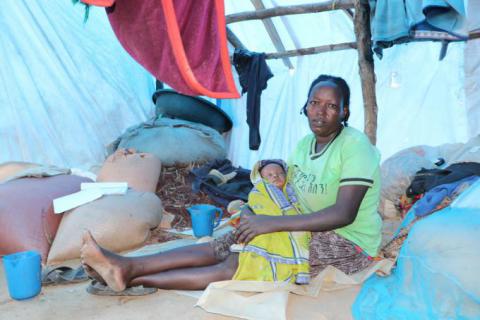“Not get sick, Have a food in our belly…that’s all we want ”: Tina’s story

Tina(30), currently lives with her husband and their seven children in Gelabo village of Konso district in Ethiopia’s southern Nations Nationalities People’s Region. Displaced from Asheko; her hometown a small village along the boundaries of Konso and Ale districts due to inter-ethnic conflict from Asheko, Tina and her family are now settling at an IDP camp where they live in a small makeshift plastic house that they share with other families. At the time of the conflict, Tina was four months pregnant with her newborn baby girl that she gave birth to at the nearby health center two months ago.
Tina’s story in her own words:
“In July last year, we lost all our belongings, our home and livestocks due to the conflict that broke out in our village. We carried none of our belongings as our primary concern was our safety and life. Since we had arrived here, we haven’t experienced anything that could endanger our lives and we feel safe. Our biggest worry now is the shortage of food and drinking water.
Since the weekly government led water distribution is not sufficient for our needs, we have to travel long distance in search of drinking water supplies from unprotected sources which usually turn out to be unsafe and contaminated. I am currently struggling to feed my six children. It had been two months since we had received any kind of food AID from the government, and that was 50kgs of wheat. It’s not enough to support families like mine. I feel sad that I am unable to provide enough food for my kids.
The health clinic at Asheko was completely destroyed by the recent conflict and is no longer functional. Although a mobile clinic had recently been set up at the Nearby farmers training center , there is not enough medicine at the clinic, so we are forced to take our children to Fayidey health center which is very far away from here .
Hanna, My little baby girl was not feeling well since last week. She has trouble breathing and is not breastfeeding like she used to. Even though I took her to the nearby mobile health clinic where they examined and gave her a syrup, the treatment hadn’t improved her condition that much. I wanted to take her to Fayidey health center where she could get better treatment, but, I don’t have the money to do that.
The other major concern here is the lack of a school in the nearby village. My two eldest children had to discontinue their education because there are no schools around. furthermore, even if there were some schools we couldn’t send them there anyway because we can’t afford to buy them school supplies. We hope that we get the means to provide them with school supplies so that they can continue their schooling.
The conflict forced thousands of people like Tina to flee their home village and they are struggling to survive in the settlement camps where they are yet to get the minimum humanitarian support they need. Until then, they are forced to continue their living in makeshift plastic houses devoid of sufficient food and non-food supplies.
“We are very thankful that Save the Children is supporting us, but we need more to survive. I would like to ask the government and others to reach out to us until the situation gets better”, Tina added.
What is Save the Children doing to help IDPs in Konso area?
having a constant presence in the area since day one, Save the Children has been working with key partners to assess the situation and respond accordingly. So far, Save the Children has managed to reach more than 3,000 households through its ESNFI and WASH support. It plans to start mobile health and nutrition programs in the affected areas in the near future.
 Ethiopia
Ethiopia